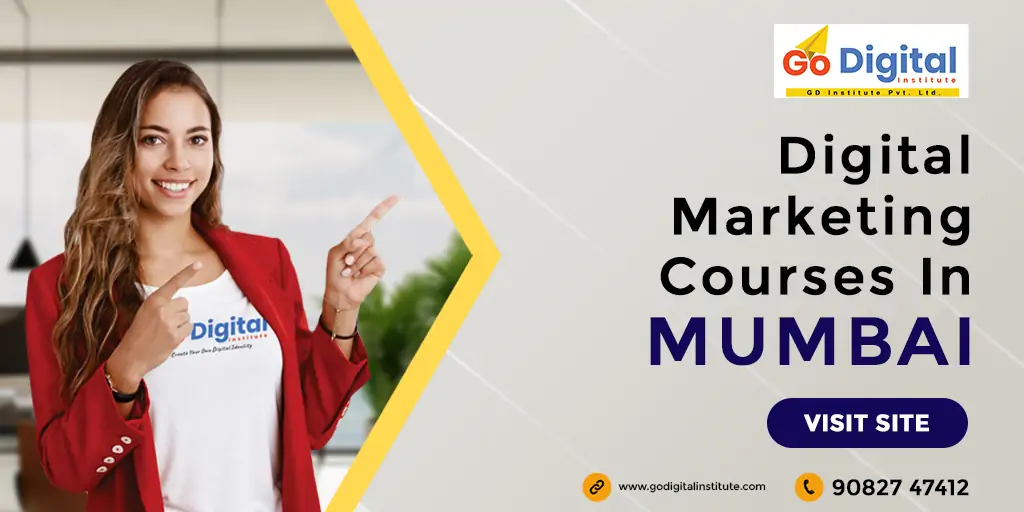
Digital Marketing Courses in Mumbai
Leave a Comment / Blog / By GD Institute
October 14, 2024
- Search Engine Optimization (SEO): To enhance organic (non-paid) traffic, websites should be optimized to rank higher in search engine results pages (SERPs) Digital marketing courses in Mumbai
We Offer Digital Marketing Courses With Placement Assistance
- Digital Marketing Agencies: Agencies specializing in digital marketing offer services to a wide range of clients, including businesses, non-profits, and government organizations. These agencies hire digital marketers to work on various client projects.
- E-commerce Companies: With the rise of online shopping, e-commerce companies like Amazon, Alibaba, and eBay are always in need of digital marketing experts to optimize their online presence, run advertising campaigns, and improve customer engagement.
- Technology Companies: Tech giants such as Google, Facebook, Twitter, and LinkedIn rely heavily on digital marketing to promote their products and services, engage with users, and drive growth. They often have dedicated teams of digital marketers.
- Startups: The startup ecosystem is booming, and many startups are looking for digital marketing talent to help them establish their brand, acquire customers, and grow their business in a competitive market.
- Corporate Marketing Departments: Virtually every company today needs to have a strong online presence, which requires digital marketing expertise. This includes industries such as finance, healthcare, retail, and hospitality, among others.
Online Digital Marketing Courses in Mumbai
- Go Digital Institute: The Go Digital Institute offers online courses and certifications in digital marketing, including the Professional Diploma in Digital Marketing. Their courses cover a comprehensive range of topics and are designed to help professionals upskill and advance their careers in digital marketing.
- Google Digital Garage: Google offers free online digital marketing courses covering a wide range of topics, including search engine optimization (SEO), social media marketing, email marketing, and more. These courses are suitable for beginners and intermediate learners.
- HubSpot Academy: HubSpot offers a variety of free online digital marketing courses, including certifications in inbound marketing, content marketing, social media strategy, email marketing, and more. These courses are ideal for those looking to specialize in inbound marketing methodologies.
- Coursera: Coursera collaborates with top universities and institutions to offer online digital marketing courses. Specializations like the �Digital Marketing Specialization� from the University of Illinois or the �Digital Marketing Nanodegree� from Udacity provide in-depth knowledge and hands-on projects.
- LinkedIn Learning (formerly Lynda.com): LinkedIn Learning offers a wide range of online courses in digital marketing. Topics include digital strategy, content marketing, analytics, SEO, and more. Courses are taught by industry professionals and updated regularly to reflect the latest trends and technologies.
Digital Marketing Courses in Mumbai Fees
- Short-term Certification Courses: Short-term digital marketing certification courses typically range from INR � to INR � These courses usually last for a few weeks to a few months and cover essential topics in digital marketing.
- Advanced Diploma or Postgraduate Programs: Advanced diploma or postgraduate programs in digital marketing are more comprehensive and can range from INR � to INR � or more. These programs may last for several months to a year and provide in-depth training in various aspects of digital marketing.
- Online Courses: Online digital marketing courses may have more flexible pricing structures and can range from INR � to INR � or more, depending on the institute and the level of certification or specialization offered.
- Institutes with Placement Assistance: Institutes that offer placement assistance or tie-ups with companies may have slightly higher fees, ranging from INR � to INR � or more, depending on the level of support provided.
Mba in Digital Marketing in Mumbai
This Diploma in Digital Marketing Program is UGC recognised by Renaissance University.
This program focuses on providing the required knowledge to start your career in Graphics Design,Product shoot with video editing and Social media marketing. It works as a stepping stone in your professional journey. The field of graphics designing and video editing in India is experiencing significance growth and has a promising scope.
Types of Digital Marketing Courses in Mumbai
| Keyword Research: Identifying relevant keywords and phrases that users are likely to search for when looking for products, services, or information related to your business. Keyword research helps in understanding user intent and targeting the right audience. | ||||||||||||||||||||||||||||||||||||||||
| On-Page Optimization: Optimizing individual web pages to improve their search engine rankings. This includes optimizing title tags, meta descriptions, headings, URL structures, and content to include relevant keywords and provide valuable information to users. | ||||||||||||||||||||||||||||||||||||||||
| Content Quality and Relevance: Creating high-quality, relevant, and engaging content that satisfies user intent and provides value. Content can include text, images, videos, infographics, and other formats. Regularly updating and adding fresh content can also positively impact search rankings. | ||||||||||||||||||||||||||||||||||||||||
| Technical SEO: Optimizing technical aspects of a website to improve its crawling and indexing by search engines. This includes optimizing site speed, mobile responsiveness, site architecture, URL structures, schema markup, and fixing issues like broken links and duplicate content. | ||||||||||||||||||||||||||||||||||||||||
| Off-Page Optimization: Building external signals or backlinks from other authoritative websites to improve the website�s credibility and authority in the eyes of search engines. Off-page SEO also involves managing online reviews, citations, and social media signals. | ||||||||||||||||||||||||||||||||||||||||
| Local SEO: Optimizing a website to appear in local search results, especially for businesses targeting local customers. This includes optimizing Google My Business listings, local citations, and obtaining positive reviews from local customers. | ||||||||||||||||||||||||||||||||||||||||
| User Experience (UX): Providing a positive user experience on the website, including easy navigation, fast loading times, mobile-friendliness, and intuitive design. A good user experience can lead to higher engagement metrics and improved search rankings. | ||||||||||||||||||||||||||||||||||||||||
Analytics and Monitoring: Tracking and analyzing website performance using tools like Google Analytics and Google Search Console. Monitoring key metrics such as organic traffic, keyword rankings, backlinks, and user behavior helps in evaluating the effectiveness of SEO strategies and making data-driven decisions for optimization.
Why Go Digital Institute is Best for Digital Marketing Courses in Mumbai
Check Our Digital Marketing Courses in Mumbai |






